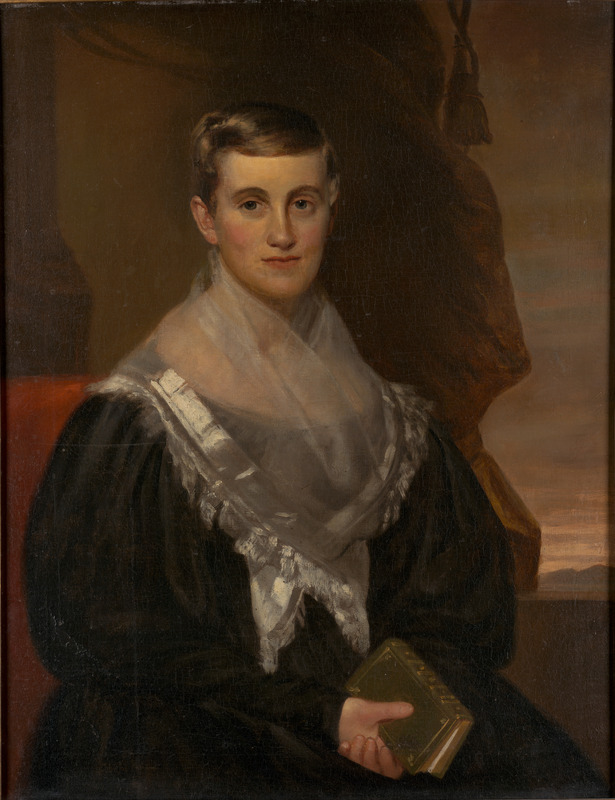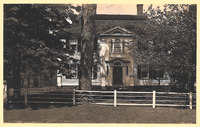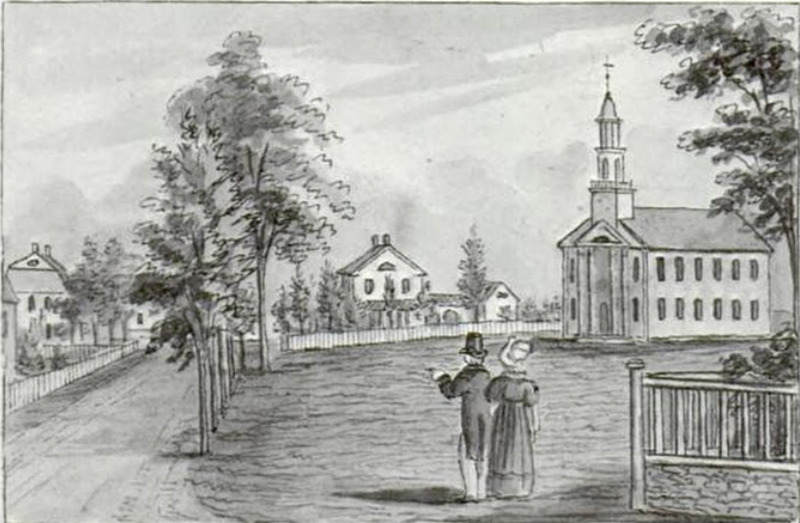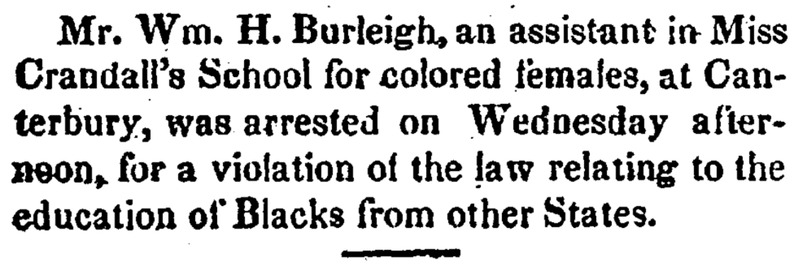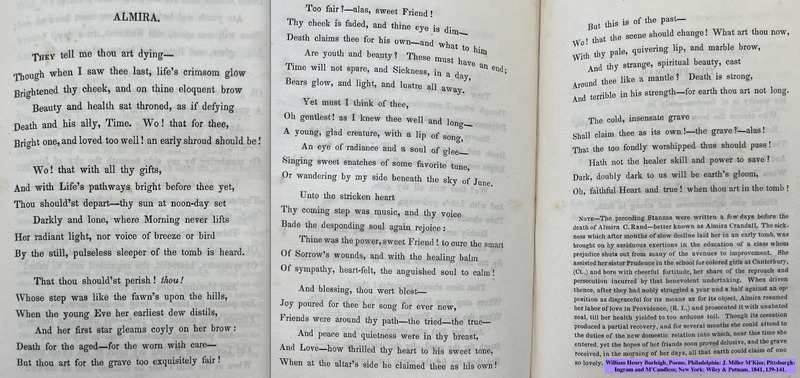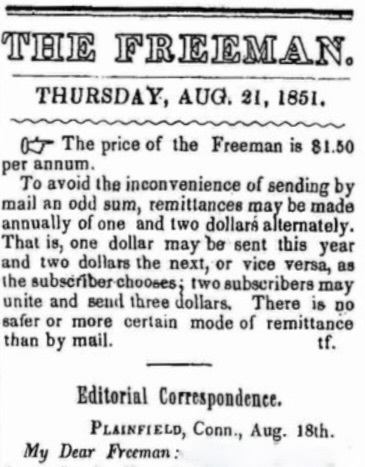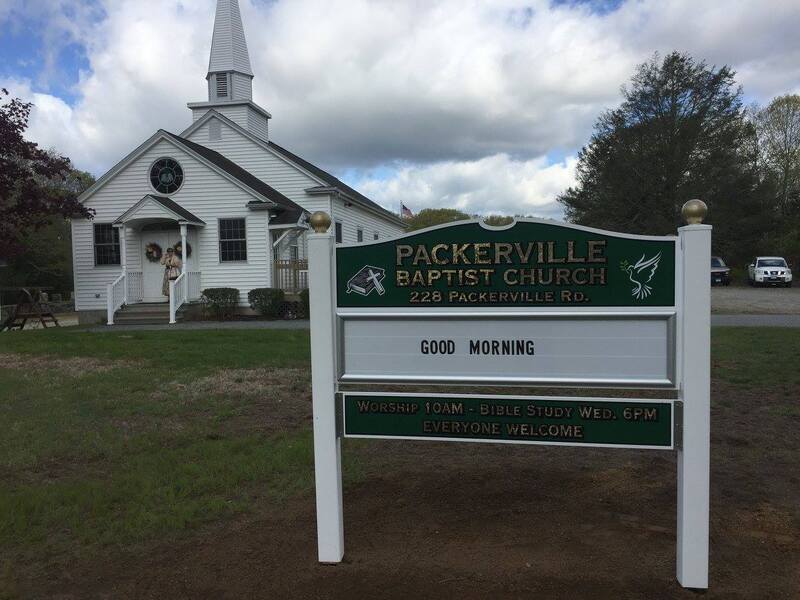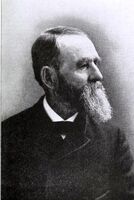The Canterbury Female Academy, Prudence Crandall, and the Black Women Students
The Role of the Burleighs in Maintaining Local Memory of the Academy
An early indication of the lasting impact that the Canterbury controversy had on the Burleigh family comes from William Henry Burleigh's poem, "Almira," written about his co-teacher, Prudence Crandall's sister Almira Crandall Rand, who died quite young. This poem is the strongest testimony, in addition to her letters to The Liberator, that we have of Almira's lively character.
Cyrus Moses Burleigh wrote an extended editorial letter to The Pennsylvania Freeman, outlining his memory of the school, and its still-living significance in 1851:
PLAINFIELD, Conn., Aug. 18th. 1851
My Dear Freeman:–No man can travel for a day in New England with his eyes open, without being forcibly impressed with the energy, the restless enterprise, the vigilance,and the peculiar tact which mark the Yankee character, and which give to the hard and rugged country the appearance of thrift and comfort which it everywhere exhibits. To the child of New England, these multiplying evidences of native strength and steady improvement, are a source of satisfaction and pride, endearing him more to the land that gave him life and nursed him on her hardy breast. He sees them on whatever side he looks, or to whatever department of human effort and progress he directs his observation. They meet him in the rail car which gives him a half day’s elegant repose while he speeds swifter than the pigeon’s flight through the length of a State; in the tasteful and rapidly rising villages sprinkled along his path; in land reclaimed from marshes or rocky hill-sides, and converted into richly-laden grain fields, fruitful orchards, and well-stocked meadows; in smoother and more substantial roads, richly bordered with maples or dark elms on either side, and now offering, or promising for coming years, luxurious shade to the traveler; in the increased facilities and encouragements for intellectual culture and development; in the cultivation of a more refined and correct taste; in the growth of a true manhood, the propagation of great truths, and the increase of humane and beneficent reforms, to which the soil and climate are both adapted.
The improvements in education, the usage of the unfortunate, the erring, and criminal, the institutions established to reclaim the vicious and fallen, and restore to society her outcast children, are especial objects of pleasure, not only to New Englanders, but to every philanthropist. Then while we must blush with shame at the treachery of party and sectarian leaders, and the cowardice or dependence of the people, while we are sometimes sick to loathing that no more manly and heroic spirit kindles through all these States at the insults and impositions of the slave power, there is much in the progress of these twenty years past, to give hope of a better day for New England in the future. When I ride upon our elegant rail-road cars, as I have done in several of these States, and observe colored men and women enjoying the same privileges and on the same terms with their white neighbors; when I see them honorably received and sustained by respectable support, at the most eminent bar of the New England courts; when I find them entering the learned professions, the walks of science and the mechanic arts, from which they have so long been excluded, and giving promise of success; when I witness these, and other proofs which I encounter of the uprising of a long crushed people, I am reminded on the omnipresence and omnipotence of “Negro hatred” here, fifteen or twenty years ago. Memories of grievous wrongs, or perpetual insults and outrages and of disheartening discouragements throng upon my thoughts.
How vividly came this contrast before me, the other day, as I rode through the neighboring village of Canterbury, and looked again upon the house where the heroic PRUDENCE CRANDALL gave her noble testimony to the equality and the rights of the colored man. Trooping down from that not distant past, came a long array of facts, bearing witness to the dishonor of my native State, and to the cruel and blind prejudices of her citizens. As those departed years returned, I saw again that exhibition of humanity, of generous feeling, of womanly devotion, enthusiasm, and strength, and of calm patience, and unconquerable fortitude, which so won my boyish admiration, and awakened my untaught sympathies, eighteen years ago. I saw again the importunities, persuasions, reproaches, threats, abuse, neglect, insults, calumnies, and even violence, endlessly repeated, to which she was subjected from all classes of society - from judges, lawyers, clergymen, and laymen, the refined and the boorish, - and which so excited my indignation, and first enlisted my feelings for the cause of the wronged and outlawed colored man. Yet it all seemed more like a dream than a reality. I could hardly realize that only eighteen years ago - so fully and freshly within my own memory - an intelligent and estimable woman, who, before, had been esteemed, and honored, and patronized throughout the community, - for so worthy an act as the establishment of a school for the instruction of colored girls, had been denounced in public town meetings, calumniated in private and public, insulted, menaced, mobbed, dragged before justices and courts, thrown into the prison’s cell before occupied by a murderer, subjected to vexatious prosecutions and fines, and exposed to the repeated assaults of ruffians upon her house, and attempts of incendiaries to burn it. It seemed a fancy of the brain, that the Legislature of this State to break up that little school of girls, in solemn assembly enacted a law, forbidding the instruction of colored children from other States within our borders, under heavy penalties of fine and imprisonment; and that the passage of the law was celebrated in Canterbury by the firing of cannon and other demonstrations of joy, and all haste was made, by “respectable, and wealthy, and pious” men, to execute it upon that benevolent lady, in its utmost rigor. I asked myself if it was possible, that for two years these, and numberless and nameless other outrages, were poured upon that excellent woman; until at last her school was dispersed by midnight violence, and she was compelled to fly to save her life; and all this was done in intelligent, schooled, pious, meeting-going, Sabbath-keeping Connecticut? There was but one answer, shameful as it was. It was all fact - and but a faint picture is the statement I have given of that fact.
But our statute book has long been purged of that inhuman Black Law, and now I see many a proof of the great moral change wrought in the State since that day, and of the good work done by the struggle for the right of education carried on here by MISS CRANDALL, and the fearless few who came to her aid.
I know there is a vast work yet to be done, to redeem New Enlgand from her corrupt union with slavery, and her subjection to the united powers of Capital and Slavery, but I believe, as surely as that old Plymouth Rock and our rugged hills still hold their places, that the time is coming. It may be that the West will lead her in the noble course of freedom, but it matters little to the whole race who pioneers the work, so that it is done.
I am again cut short, abruptly, by mail time. I hope to be again at my post before another week. With cordial greetings of love and good will to all your readers, I am,
Yours for “the good time coming,”
C.M.B.
Lucian Burleigh helped retain the memory of the contrasting religious responses to the students at the Canterbury Female Academy. He spoke often of the role played by Packerville Baptist Church - the church with which he was affiliated, that had ordained him an evangelist - in support of Crandall's Black women students, even indicating that this stance had made that church attractive to him even before he joined it formally:
"I remember that 'nigger pew' up at the corner of the gallery [at the Canterbury Congregationalist Church] — indeed two of them, one for colored males in one corner, and one for females in the other corner. It made an abolitionist of me when I saw a Christian church refuse the use of the unoccupied slips along side of the 'nigger-pew' to intelligent and well-behaved young ladies merely because they had colored blood in their veins; and I gave my voice for human rights, till by the stern arbitrament [sic] of war, Slavery went down in a sea of blood. I ever honored the church in Packerville, for opening their church doors to those wronged and abused pupils of the 'colored school'."
"At the close of the afternoon service, acting on the suggestion of Brother Burleigh that the beautiful flowers decorating the church be used to decorate the grave of our first pastor, Rev. Levi Kneeland, led by him the church members and many visiting friends went in procession, bearing the beautiful flowers and with deep emotion decorated the grave of the beloved and lamented Kneeland.
References
Allen B. Lincoln, editor. A Modern History of Windham County Connecticut: A Windham County Treasure Book (Chicago: S.J. Clarke Publishing Company, 1920), v. 1, p. 589.
Packerville Baptist Church, Records 1828-1928. Three Volumes. Hartford: Connecticut State Library, acquired 1933. Volume II: Obituaries 1848, 1849, 1865; Church Meetings 1849-1900; Ministers 1881-1885; Historical Sketches 1828-1878.
References
C.M.B. [Cyrus Moses Burleigh]. "Editorial Correspondence." The Pennsylvania Freeman New Series 8:34:2 (August 21, 1851).
Rycenga, Jennifer. Schooling the Nation: The Success of the Canterbury Female Academy for Black Women. Urbana, Illinois: University of Illinois Press, 2025.
Rycenga, Jennifer; Nick Szydlowski; Sharesly Rodriquez. The Unionist Unified - website gathering all known content from The Unionist, as well as comments and criticisms of this first-ever Abolitionist newspaper in Connecticut.
Rycenga, Jennifer. ““Be Ashamed of Nothing But Sin”: Prudence Crandall, Levi Kneeland, and Connecticut Baptists.” American Baptist Quarterly, 34:3-4 (Fall-Winter 2015): 324-342.
Strane, Susan. A Whole-Souled Woman: Prudence Crandall and the Education of Black Women. New York: W.W. Norton and Company, 1990.
Williams, Donald E. Prudence Crandall's Legacy: The Fight for Equality in the 1830s, Dred Scott, and Brown v. Board of Education. Middletown, Connecticut: Wesleyan University Press, 2014.


